
The Russian Revolution was a period of political and social change in the Russian Empire, starting in 1917. This period saw Russia abolish its monarchy and adopt a socialist form of government following two successive revolutions and a bloody civil war. The Russian Revolution can also be seen as the precursor for the other European revolutions that occurred during or in the aftermath of World War I, such as the German Revolution of 1918–1919.
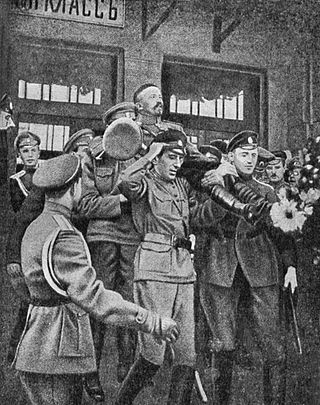
The Kornilov affair, or the Kornilov putsch, was an attempted military coup d'état by the commander-in-chief of the Russian Army, General Lavr Kornilov, from 10 to 13 September 1917, against the Russian Provisional Government headed by Aleksander Kerensky and the Petrograd Soviet of Soldiers' and Workers' Deputies. The exact details and motivations of the Kornilov affair are unconfirmed due to the general confusion of all parties involved. Many historians have had to piece together varied historical accounts as a result.
"Dual power" refers to the coexistence of two governments as a result of the February Revolution: the Soviets, particularly the Petrograd Soviet, and the Russian Provisional Government. The term was first used by the communist Bolshevik leader Vladimir Lenin (1870–1924) in the Pravda article titled "The Dual Power".
Maria Nikolaeva Todorova is a Bulgarian historian who is best known for her influential book, Imagining the Balkans, in which she applies Edward Said's notion of "Orientalism" to the Balkans. She is the daughter of historian and politician Nikolai Todorov, who was Speaker of the National Assembly of Bulgaria and acting President of Bulgaria in July 1990.

The July Days were a period of unrest in Petrograd, Russia, between 16–20 July [O.S. 3–7 July] 1917. It was characterised by spontaneous armed demonstrations by soldiers, sailors, and industrial workers engaged against the Russian Provisional Government. The demonstrations were angrier and more violent than those during the February Revolution months earlier.

The military history of Russia has antecedents involving Kievan Rus' and the Rus' principalities that succeeded it, the Mongol invasion of the early 13th century, Russia's numerous wars against Grand Duchy of Lithuania, Crown of the Kingdom of Poland, Sweden, and Ottoman Empire, Prussia, France. The 20th century saw Russia's involvement in two world wars, as well as smaller military conflicts. During the Cold War, the greatly enlarged armed forces suppressed rebellions in Eastern Europe and became a nuclear superpower hostile to NATO, as well as China after 1960. The post-Cold War military history of the Russian Federation began in 1991.
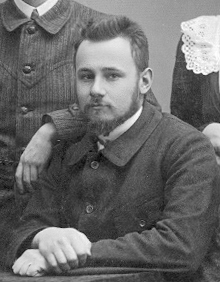
George Vernadsky was a Russian-born American historian and an author of numerous books on Russian history.
Jewish Bolshevism, also Judeo–Bolshevism, is an antisemitic conspiracy theory that claims that the Russian Revolution of 1917 was a Jewish plot and that Jews controlled the Soviet Union and international communist movements, often in furtherance of a plan to destroy Western civilization. It was one of the main Nazi beliefs that served as an ideological justification for the German invasion of the Soviet Union and the Holocaust.
Firuz Kazemzadeh was a Russian-born American historian who was professor emeritus of history at Yale University.
The Heldt Prize is a literary award from the Association for Women in Slavic Studies named in honor of Barbara Heldt. The award has been given variously in the following categories:
Mark Bassin is a geographer and specialist on Russian and German geopolitics. He is currently employed as a professor in historical and contemporary studies at Södertörn University.

Mass killings under communist regimes occurred through a variety of means during the 20th century, including executions, famine, deaths through forced labour, deportation, starvation, and imprisonment. Some of these events have been classified as genocides or crimes against humanity. Other terms have been used to describe these events, including classicide, democide, red holocaust, and politicide. The mass killings have been studied by authors and academics and several of them have postulated the potential causes of these killings along with the factors which were associated with them. Some authors have tabulated a total death toll, consisting of all of the excess deaths which cumulatively occurred under the rule of communist states, but these death toll estimates have been criticized. Most frequently, the states and events which are studied and included in death toll estimates are the Holodomor and the Great Purge in the Soviet Union, the Great Chinese Famine and the Cultural Revolution in the People's Republic of China, and the Cambodian genocide in Democratic Kampuchea.
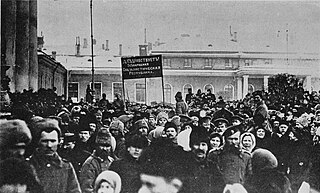
The February Revolution, known in Soviet historiography as the February Bourgeois Democratic Revolution and sometimes as the March Revolution, was the first of two revolutions which took place in Russia in 1917.
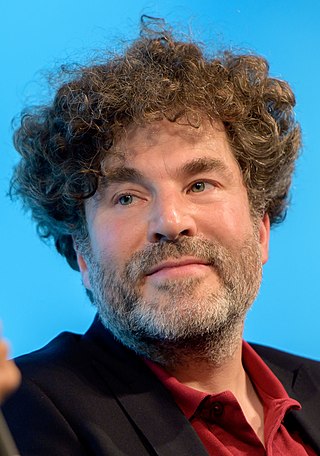
Jan Plamper was a German professor of history at the University of Limerick. His research interests included Russian history, the history of emotions, sensory history, and the history of migration.
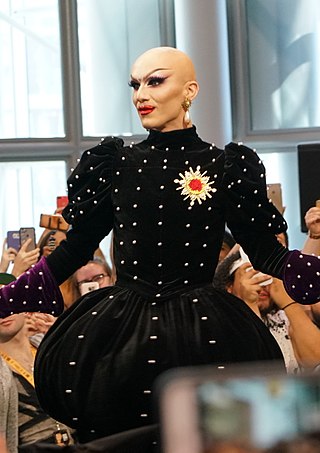
Alexander "Sasha" Hedges Steinberg, known professionally as Sasha Velour, is an American drag queen, artist, actor, and stage and television producer, based in Brooklyn, New York. Velour is known for winning the ninth season of RuPaul's Drag Race, her drag revue NightGowns, and her one-queen theatrical work, Smoke & Mirrors.
This is a select bibliography of post World War II English language books and journal articles about the Revolutionary and Civil War era of Russian (Soviet) history. The sections "General Surveys" and "Biographies" contain books; other sections contain both books and journal articles. Book entries may have references to reviews published in English language academic journals or major newspapers when these could be considered helpful. Additional bibliographies can be found in many of the book-length works listed below; see Further Reading for several book and chapter length bibliographies. The External Links section contains entries for publicly available select bibliographies from universities.
This is a select bibliography of post World War II English language books and journal articles about Stalinism and the Stalinist era of Soviet history. Book entries have references to journal reviews about them when helpful and available. Additional bibliographies can be found in many of the book-length works listed below.

Below is a list of post World War II scholarly books and journal articles written in or translated into English about communism. Items on this list should be considered a non-exhaustive list of reliable sources related to the theory and practice of communism in its different forms.
This is a select bibliography of post-World War II English language books and journal articles about the history of Russia and its empire from 1613 until 1917. It specifically excludes topics related to the Russian Revolution. Book entries may have references to reviews published in academic journals or major newspapers when these could be considered helpful.
Michael David-Fox is an American historian who studies modern Russia and the Soviet Union.









